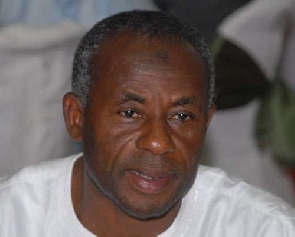General News of Wednesday, 21 August 2019
Source: myxyzonline.com
New ‘galamsey’ law can’t save Ghana lands – Collins Dauda
Former Minister of State in charge of Lands and Natural Resources, Alhaji Collins Dauda is doubting the effectiveness of a new mining law that will ensure convicted illegal miners face at least 15 years in prison.
Mr. Dauda who is also the Member of Parliament (MP) for Asutifi South believes the laws intended to fight illegal mining (galamsey) may not bite as expected because the government has failed to regulate the mining industry well, especially small scale mining.
“Look, those engaging in the act are jobless people; that is their source of livelihood and they need to eat too,” the former minister said in an interview on Dwaboase on Power 97.9 FM on Wednesday.
His comment comes a day after President Nana Akufo-Addo assented to an amendment to the country’s existing mining laws
The new law, amended from the Minerals and Mining Act, 2015 (Act 900) and the Minerals Commission Act, 1993 (Act 450), also criminalises any aiding and abetting of illegal mining activities as well as the use of other equipment for mining in water bodies.
However, Mr. Dauda observed that fighting the canker is not an easy task since those engaging in galamsey usually form a “cabal” in a bid to be successful in their illegal trade.
“These people form a cabal so when you want to clamp down on them it becomes difficult. Because they already know about the plans of the government, by the time law enforcement agents arrive at their sites, they would have alreaded bolted. They return after the raid and the cycle continues,” he explained.
To the former Local Government and Rural Development Minister, to sanitise the mining sector, the government ought to have engaged the illegal miners at the local level and deliberate on the terms for such activities so as to protect the environment as well as their sources of livelihoods. He also added the District Assemblies could be a key stakeholder in such discussions before licences are issued to them to operate as small scale miners.
Currently, the government has issued some licences to a section of small scale miners to help promote responsible mining in the country to save water bodies and arable lands.
But Mr. Dauda believes the process was not transparent enough to reduce illegal mining, thereby heightening the activities of illegal miners despite the Akufo-Addo government’s claim that the canker is being curbed. He added, the evidence of the continuous illegal mining is the high turbidity of most of the country’s rivers.
“We say we are making gains in the fight against galamsey but the rivers still look as they were before the fight commenced. We are not making any gains because the government hasn’t regularised galamsey,” he told co-host Kwame Minkah.
To him, “the laws are amended but it will be difficult to arrest illegal miners.”
Government’s Hopes
Meanwhile President Akufo-Addo believes the new law will reduce drastically the illegal plowing of lands and water bodies.
“It [the bill] is was brought to me for my ascent so it is now law. Parliament has amended the mining law and heightened considerably the penalties engaged in illegal mining. We are talking about minimum sentences of 15 years, maximum 25 years. We have increased punishment for foreigners who intervene in this industry,” Nana Akufo-Addo noted while speaking at a meeting with the Council of State in Accra.
The maximum jail term for foreigners in the previous law was 20 years. Ghanaians who engaged foreigners in this regard also faced jail terms between five and 10 years.
Under the new law, convictions for illegal mining could attract minimum fines of 150,000 penalty units.
So far the government’s anti illegal mining campaign has seen the arrest of hundreds while dozens of Ghanaians and foreigners have been imprisoned.
As a way of dealing with galamsey, the government introduced alternative livelihood programmes in some 18 districts severely affected by illegal mining.











